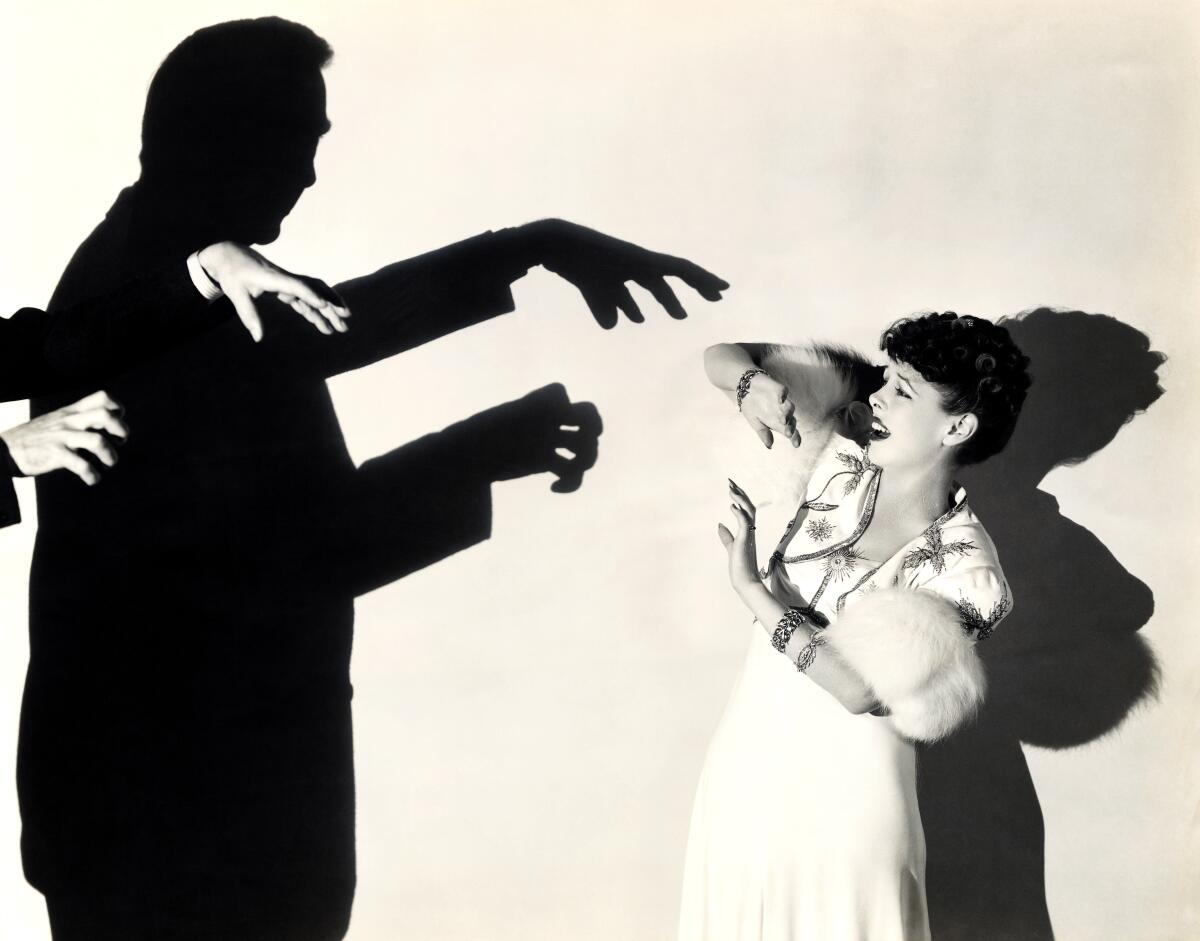Column: Can a scammer hypnotize you over the phone? Let’s ask professional hypnotists

- Share via
A common response to scam reports is wondering how anyone could fall for, well, take your pick — the grandparent scam, the IRS scam, the Microsoft scam.
An Aliso Viejo woman found herself asking just that after she was recently duped into buying more than $3,000 worth of gift cards at Walmart and CVS and passing them along to a con artist who claimed to be a fraud specialist with Amazon.
I asked how she could have been tricked by such an obvious scheme.
“I wish I knew!” she replied. “I did things I know were wrong, things I would never do in a million years!”
The woman now believes she was hypnotized over the phone into following the scammer’s increasingly outlandish requests.
And she may be right.
“My mother is a sharp cookie,” said Debbie Katz, 57, who contacted me after her 82-year-old mom got caught up in all this. “She’s not impaired in any way. There’s just no explanation for how this happened.”
Katz’s mom asked that I protect her privacy by only using her first name, Isabel. I spent a fair amount of time on the phone with Isabel and found her to be lucid and quick-witted.
Which makes what I’m about to relate extremely difficult to understand.
How did an identity thief get $19,000 from a SoCal man’s account? Easy. Chase bank gave it to him in the form of overdraft protection.
As Isabel tells it, she got a call the other day that her caller ID identified as being from Amazon.
Normally, she said, she doesn’t pick up calls from numbers she doesn’t recognize. Like many of us, though, she’s been doing a lot business with Amazon since the start of the pandemic, so she was worried there might be a problem.
And there was — or so she was told. A man identifying himself as Roy said he was phoning from the fraud department at the e-commerce giant with concerns about a $299.99 transaction.
Was Isabel aware of such a transaction? No, she told the caller. It wasn’t hers.
Roy asked if she was near a computer. She was. He gave her a web address to type in. It took Isabel to a page that appeared to be part of Amazon’s site and did indeed show a $299.99 transaction.
“From that point on,” she told me, “I did everything I know I should not have done.”
Roy explained that to get her $299.99 back, Isabel would need to temporarily send $299.99 to Amazon (I know; makes no sense). He asked if she had sufficient funds in the bank.
Roy waited as Isabel logged on to her checking account and found she didn’t have $300 to spare. Roy instructed her to transfer the funds from her savings account.
Isabel apparently typed an extra digit, mistakenly transferring $2,999.99 — and Roy knew it. He immediately said that to fix the problem with Amazon, Isabel would need to send the larger amount to the company.
Perhaps Roy heard Isabel mention the error to her 93-year-old husband, who was sitting nearby and listening to the call on speaker.
Or perhaps that bogus Amazon page downloaded malware onto her computer. Isabel’s bank would subsequently warn of unusually high activity involving her account, as if someone was repeatedly trying to log in.
A former LAPD detective discovered that his car insurer had quadrupled his pandemic mileage estimate to justify a rate increase.
I asked what Roy sounded like. What kind of voice did he have?
“It was calm, comforting, trustworthy,” Isabel replied. “It was very even, no inflections, no highs or lows. It was a nice voice.”
Roy kept repeating the phrase “Don’t hang up the phone.” He said it again and again, like a mantra.
“Don’t hang up the phone,” Roy said as he instructed Isabel and her husband to get into the car and drive to Walmart, where they purchased $1,000 worth of American Express gift cards.
“Don’t hang up the phone,” he said as he instructed Isabel and her husband to drive to CVS and purchase another $1,000 worth of AmEx gift cards.
“Don’t hang up the phone,” Roy said as he instructed Isabel to take pictures of the front and back of each card and email them to him, thus providing both the card number and the PIN.
Isabel figures she was on the phone with Roy for almost two hours as she performed these tasks. Then she and her husband returned home, where Roy said he’d call back with further instructions.
“He called the next morning,” Isabel told me, “and we went back to Walmart and bought another $1,200 worth of gift cards.”
At some point afterward, she noticed the cards and receipts in her kitchen, and didn’t understand why they were there. As the memories grew fresh, Isabel said, she broke down sobbing.
“Oh my God,” she recalled saying. “What have I done?”
Interestingly, when Isabel reported this to the Orange County Sheriff’s Department, which handles police matters for Aliso Viejo, she said the deputy asked the same questions I did: What was Roy’s voice like? What did he say? How did he say it?
No one at the Sheriff’s Department returned my call for comment.
While unusual, there have been reports of people saying they were hypnotized by scammers. In 2012, a Boston woman told police she believed she was hypnotized into parting with her jewelry and $160,000 in cash.
There have also been a number of cases of criminal suspects insisting they were hypnotized into breaking the law. A man charged with a 1948 killing in Los Angeles claimed he was hypnotized into pulling the trigger (he was found not guilty by reason of insanity).
On the other side of the law-enforcement equation, the FBI and other agencies use hypnosis from time to time to help solve cases.
But is it possible to hypnotize someone over the phone and get them to do things they know are foolish?
“Yes,” said Kevin Stone. “The answer is yes.”
Stone, a certified hypnotherapist, bills himself as the “Hollywood Hypnotist.” He says the moniker was bestowed upon him by “Access Hollywood,” which did a segment on him and his celebrity clients.
Along with more serious clinical pursuits, Beverly Hills-based Stone performs a hypnosis act at corporate events, colleges and other venues. His website says he’s “the most requested hypnotist in the world.”
“Hypnosis is a natural, organic process,” Stone told me. “The power of suggestion can be used to manipulate or sway people.”
I described Isabel’s experience with Roy — the soothing voice, the repeated phrase, the gradual building of trust with increasingly complex tasks.
Stone said he couldn’t say for sure what techniques Roy was employing because he wasn’t there, “but he’s obviously using his words and sentence structure to lower her inhibitions.”
“Repetition is one of the techniques used to introduce the trance,” Stone observed.
Trance? Like Isabel wasn’t aware of what was happening?
“No,” Stone answered. “She knew. She went into Walmart and knew all these things were wrong. But she still did them because she didn’t care.
“There was something inside her telling her that, even though she may be suspicious, it’s all OK. She’ll benefit from it.”
This sort of thing won’t work on everyone. Stone said it’s likely Roy cycles through many potential victims before he comes across someone as apparently susceptible to suggestion as Isabel.
And once he has someone like that in his clutches, Stone said, “sky’s the limit.”
Consumers lost more than $3.3 billion to fraud last year, up a whopping 83% from the year before, according to the FTC.
I heard the same from Burbank’s Glenn Rottmann, another certified hypnotherapist and performer whose own website touts “a Hypnosis Stage Show unlike any other.”
He said people such as Isabel are known in the hypnosis world as “high responders.”
“I say, ‘Sleep,’ and they drop in their chair like a rag doll,” he told me. With such people, he said, “I could just walk up and say, ‘Look at me, look at me, look at me — and sleep.’”
Like Stone, Rottmann recognized hypnosis techniques being employed on Isabel. “It’s about establishing yourself as the expert so they want to please you,” he said.
The way Roy went from the phony Amazon page to the bank account to the gift cards — “That’s exactly what I do in a stage show,” Rottmann said. “I go from simple suggestions to much more complex ones.”
He said Roy began by creating an emotional state — fear — by claiming Isabel was a fraud victim. He then began influencing her by introducing ways to alleviate that fear.
Each task was intended to encourage compliance on Isabel’s part, Rottmann said.
The repeated instruction not to hang up reinforced that compliance, to the point where Isabel was doing things no rational person would do, and not questioning her own behavior.
As a result, Rottmann said, Roy was able to keep stringing Isabel along and to even get her to purchase more gift cards the next day. Her desire to please him, and to resolve the emotions Roy had instilled, were more powerful than her innate sense of caution.
“It’s horrible,” Rottmann said, “but it’s also genius, in an evil way.”
I can’t say with 100% certainty this is what really happened. But Isabel’s actions were so over the top, so obviously against her interests, it’s hard to come up with a better explanation for why she did these things.
Both Rottmann and Stone said forms of hypnosis are far more common in everyday life than most people realize.
Variations of these techniques, they said, are routinely employed by salespeople, motivational speakers, politicians and others who want to push people into believing or doing what they want.
Often, it’s benign, such as McDonald’s saying over and over in a marketing campaign that “you deserve a break today.” Sometimes it’s more insidious, such as a political figure repeating a blatant lie about election fraud (“Stop the steal”).
And occasionally, with the right person, it’s what Stone called “a lethal combination” — a skilled practitioner cruelly manipulating a willing subject.
What can you do? Watch for the usual red flags of a scam. Hang up any time someone you don’t know instructs you to give them money, especially if gift cards are involved.
And before you get in too deep, question whether any of what’s happening makes sense. If not, walk away.
“Hypnosis can get people to do all sorts of things,” Stone said. “We’re all suggestible. That’s part of human DNA.”
Knowing it’s possible, he said, is the first line of defense in protecting yourself.
More to Read
Inside the business of entertainment
The Wide Shot brings you news, analysis and insights on everything from streaming wars to production — and what it all means for the future.
You may occasionally receive promotional content from the Los Angeles Times.














